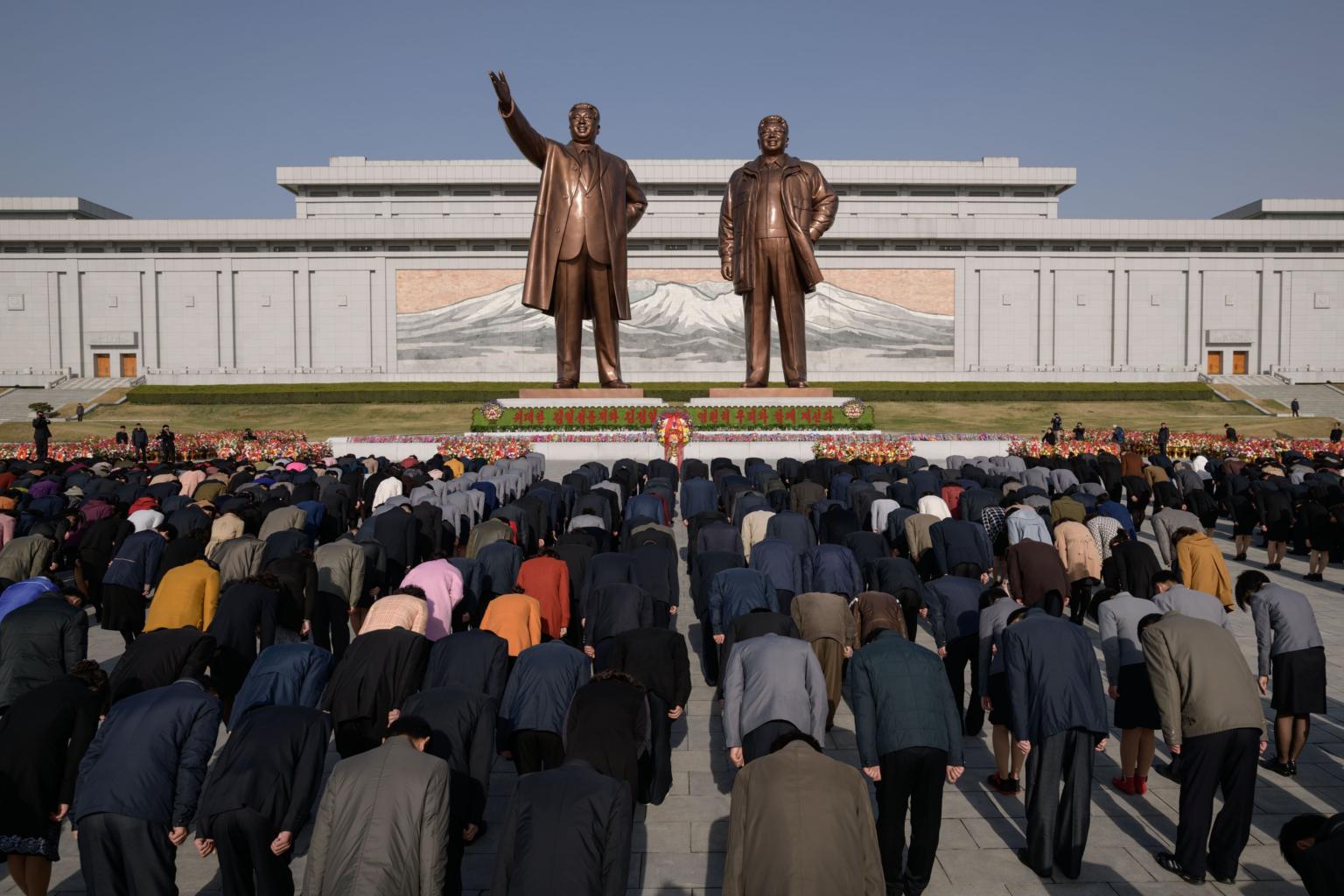Australian student Alek Sigley feared detained in North Korea
Sign up now: Get insights on Asia's fast-moving developments

People bow as they pay their respects before the statues of late North Korean leaders Kim Il Sung and Kim Jong Il on Mansu hill in Pyongyang, on April 15, 2019.
PHOTO: AFP
SYDNEY (AFP) - Australia on Thursday (June 27) said it was "urgently seeking clarification" on the fate of a citizen feared detained in North Korea.
The department of foreign affairs said it was in contact with the family of a man "who has been reported as being detained in North Korea".
"The Department is urgently seeking clarification," a statement from Canberra read. "Owing to our privacy obligations, we will not provide further comment."
Korean-language media named him as Alek Sigley, one of only a handful of Western students at Kim Il Sung University, where he studies Korean literature.
He also runs a company specialising in tours of North Korea and has written articles about Pyongyang's dining scene and other issues for NK News and other outlets.
His last social media posts came three days ago.
In a statement, Mr Sigley's family said there was no confirmation yet that he had been arrested.
"The situation is that Alek has not been in digital contact with friends and family since Tuesday morning Australian time, which is unusual for him," the statement said.
Mr Sigley, from Perth in Western Australia, had been studying Korean literature at Kim Il Sung University since 2018, while running a company specialising in tours of North Korea.
He married a Japanese woman in a ceremony in Pyongyang last year.
Mr Sigley has written various blog posts and articles about everyday life in Pyongyang - focusing on everything from the city's dining scene to North Korean app reviews and steering well clear of sensitive political issues.
His friend Crispin Rovere described him as "the nicest guy on Earth" and said that he was "only ever interested in sharing North Korea's culture with the world and improving people-to-people connections."
News of Mr Sigley's disappearance came just hours before Prime Minister Scott Morrison was to meet US President Donald Trump on the sidelines of the G-20 summit in Osaka, Japan.
Mr Trump - who will go on to South Korea amid rumours of renewed talks with the North - had been intimately involved in the case of Otto Warmbier, a University of Virginia student who was imprisoned during a tour of the authoritarian state after being accused of taking down a propaganda poster.
Doctors said he suffered severe brain damage while in detention, fell into a coma and died days after arriving back in the United States in June 2017. He was 22.
Australia has no diplomatic mission of its own in Pyongyang and is represented in North Korea by the Swedish embassy.
Canberra advises against non-essential travel to North Korea - where several foreigners have been detained in the past.
Consular advice recommends Australians "stay as short a time as possible, eliminate unnecessary activities, and review your security arrangements".
The vast majority of foreign students in North Korea come from neighbouring China, where education is significantly more expensive.
The foreigners have separate classes to domestic students and fees are in the range of US$3,000 (S$4,066) a year.
They also have their own dormitory so that - aside from a few North Koreans assigned to the same facility - they have limited contact with local students.
In a post in January this year, Mr Sigley describes a strong interest in east Asia and "socialism" and recounts his first trip to North Korea in 2012.
The son of an anglo-Australian man and Chinese mother, he previously studied at Fudan University in Shanghai and in South Korea before moving to Pyongyang, according to his post.
"I'm enrolled in a master's degree in Korean literature in the university's postgraduate school. Because I am the only foreign student in this particular programme, my courses are all conducted one-on-one with the teacher," he wrote.
Steering clear of politics, Mr Sigley describes a life chatting with Chinese exchange students, drinking with Russian students and playing video games and going to restaurants with students from Canada and Sweden.
In an article for the Guardian newspaper published in late March, Mr Sigley said he had "nearly unprecedented access" to Pyongyang as a long-term foreign resident.
"I'm free to wander around the city, without anyone accompanying me. Interaction with locals can be limited at times, but I can shop and dine almost anywhere I want," he wrote.


